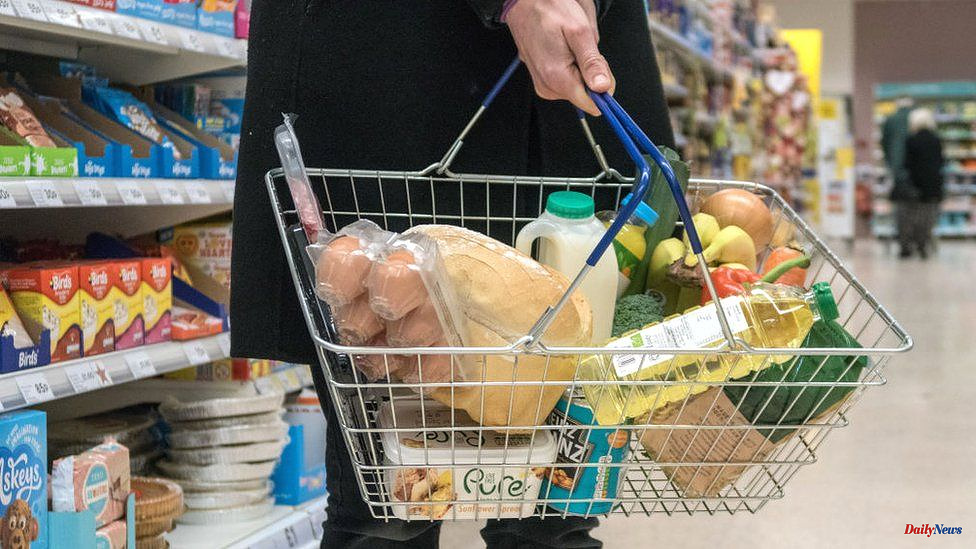As rising living costs bite into household budgets, many households are cutting back on food shopping.
Nearly half (48%) of adults polled by the Office for National Statistics said that they have bought less food in recent weeks due to rising prices.
According to the ONS, most people were experiencing an increase in their monthly outgoings due to the rising cost of food.
Tesco and Asda Supermarkets have reported that customers are cutting back on their shopping.
Asda stated to the BBC that some customers are asking cashiers not to scan items when the total reaches PS30. This is in an effort to reduce costs and switch to budget ranges.
Tesco, the UK’s largest supermarket, said that it is beginning to see early signs of shoppers changing their shopping habits in response to high inflation. This refers to the rate at which prices increase. It includes buying less food, visiting more often, and purchasing less food.
According to the ONS, supermarket feedback also indicated that customers are spending less because of rising living costs.
The study found that supermarket sales dropped 1.5% in May and that specialist shops like butchers, bakers, and butchers saw a 2.2% drop.
Helen Dickinson (chief executive of British Retail Consortium) stated that customers are choosing to buy value-range products over premium items.
The ONS reported that retail sales fell 0.5% in May and that it revised its April sales growth estimate to 0.4%, down from 1.4%.
Prices are rising at an unprecedented rate, reaching their highest point in 40 years. Inflation is at 9.1% in the UK, which is the highest since March 1982.
According to the RAC motoring group, the average petrol price was PS1.90 on Thursday. Diesel prices were edging towards PS2 a litre.
Inflation is driven by fuel and energy prices, but food prices drove the latest rise in May with rising prices for bread, cereal, and meat.
Sarah Coles, Hargreaves Lansdown senior personal finance analyst, stated that the "horrors" of April's unprecedented increase in energy bills "swallowed an even larger slice of households' income" and "kept them under control."
She said, "It's not only the rising bills of today that is worrying us. It's also the prospect of higher bills tomorrow and fears of an impending recession, which could cause our finances to unravel completely."
The most obvious evidence of the impact of rising living costs on household finances is evident in cutting back on food.
The ONS report is in line with a BBC survey that found 56% had purchased fewer groceries and the same percentage had not eaten.
It is food, which is a necessity for all, and this shows how daily life is affected.
In the winter and autumn, people may be less likely to heat their homes. People will continue to look at ways to reduce their heating and food expenses, regardless of whether they are heating or eating.
A BBC-commissioned survey of over 4,000 people found that 82% believed their wages should rise to meet the rising cost of goods and services.
Unions and workers have been pushing for raises. This week saw strikes on the railways and BA workers at Heathrow voting in favor of striking over the summer.
The government warns employers against giving big raises in salaries to employees. This is because they fear an "inflationary spiral" that would see firms increase wages and then pass on the increased cost to their customers.
This drop in food sales is a result of a long-running measure that measures consumer confidence, which has seen its lowest score since 1974.
GfK, a market research firm, reported that its consumer mood index dropped to -41 in June from May's -40. This is below levels that were previously associated with recessions.
According to the ONS, despite record high petrol prices, food sales declined while fuel sales rose 1.1% in May.
Heather Bovill (Deputy Director for Surveys and Economic Indicators at the ONS), suggested that the increase in fuel sales could be due to more workers returning to work.
She said that the increase in clothing sales was offset by falls in household goods and department store sales. Retailers in these areas reported consumer reluctance due to higher prices and affordability concerns.
According to the ONS, although online sales have declined in May, they are still significantly higher than before the pandemic.
What are some ways you can cut down on food shopping? Which items are you omitting? Tell us by emailing: haveyoursay@bbc.co.uk.
If you would like to speak with a BBC journalist, please include a contact phone number. These are the ways you can get in touch with us:
If you are reading this page and can't see the form you will need to visit the mobile version of the BBC website to submit your question or comment or you can email us at HaveYourSay@bbc.co.uk. Any submission should include your name, address, and age.












